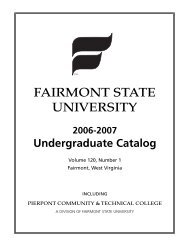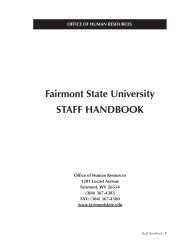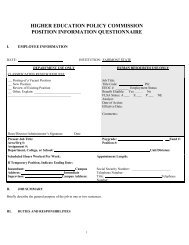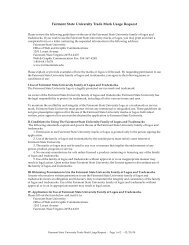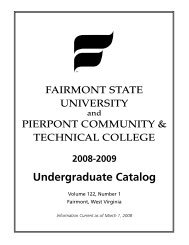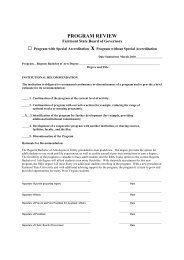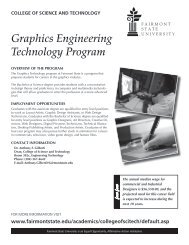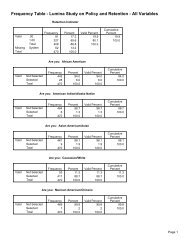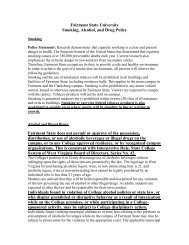Faculty Handbook - Fairmont State University
Faculty Handbook - Fairmont State University
Faculty Handbook - Fairmont State University
Create successful ePaper yourself
Turn your PDF publications into a flip-book with our unique Google optimized e-Paper software.
100<br />
economy of West Virginia benefit from new applications of a knowledge and<br />
technology that enable more and better jobs, a higher standard of living, and<br />
enhanced knowledge and quality of life. Faculties and individual faculty members<br />
benefit from being able to teach, acquire a new knowledge, serve public needs, and<br />
perform institutional and professional roles more effectively. Institutions of higher<br />
learning benefit from enhanced capacity and flexibility to carry out their missions<br />
in an era where it is more practical to enhance or renew skills and knowledge of<br />
existing faculty members.<br />
2.3. Therefore, the board affirms the unique, integral contribution of faculty members<br />
to the mission of <strong>Fairmont</strong> <strong>State</strong> <strong>University</strong> and all higher education: teaching,<br />
producing scholarly work that contributes to knowledge and creativity, and<br />
serving public and institutional needs. The Board further recognizes through its<br />
policy and actions that the knowledge and skills of faculties and individual faculty<br />
members need to be developed, maintained, supported, and renewed, and that the<br />
primary responsibility for accomplishing these ends resides at the institutional<br />
level.<br />
SECTION 3. DEFINITION OF FACULTY DEVELOPMENT<br />
3.1. <strong>Faculty</strong> development includes all activities designed to improve faculty<br />
performance in all aspects of their professional lives: as teachers stimulating and<br />
guiding student learning, as scholars, advisers, designers and evaluators of<br />
academic programs and courses, as academic leaders, contributors to public<br />
service, participants in institutional decisions, and in other faculty roles for<br />
achieving the <strong>University</strong>’s mission. Recognized beneficial components of faculty<br />
development include professional scholarly and creative development, personal<br />
development, and organizational development.<br />
3.2. Examples of valid, tangible faculty development activities include, but are not<br />
limited to: sabbatical or academic leaves to complete a doctorate, expand existing<br />
knowledge, learn a new field needed in the curriculum, or achieve other purposes;<br />
workshops for improving faculty teaching skills; workshops and internships to<br />
enhance faculty roles in academic leadership; seed money grants that enable<br />
faculty to pursue larger, external grants or contracts; projects to improve student<br />
advising or assessment of student learning; summer grants or summer minisabbaticals<br />
to develop a needed new program or course, conduct research on<br />
teaching, or accomplish other beneficial aims; attendance at academic conferences<br />
and meetings; and programs to better orient faculty members and improve their<br />
skills.<br />
SECTION 4. FACULTY ELIGIBILITY AND PARTICIPATION<br />
4.1. Eligibility. Any person who is a full-time or part-time faculty member is eligible for<br />
faculty development in accordance with this policy. Full-time faculty members,<br />
including Deans and Chairs, are eligible to apply for all faculty development<br />
activities. Part-time faculty members are eligible to apply for all faculty<br />
development activities and awards except sabbatical leaves, leaves without pay,<br />
and mini-grants. In supporting faculty development for full-time and part-time<br />
faculty members, factors to be considered will include the potential benefits and<br />
costs to the institution, the academic program, and the faculty member.<br />
4.2. Participation. As noted elsewhere in this policy, faculty members are<br />
responsible for improving their professional effectiveness, and the <strong>University</strong> is



